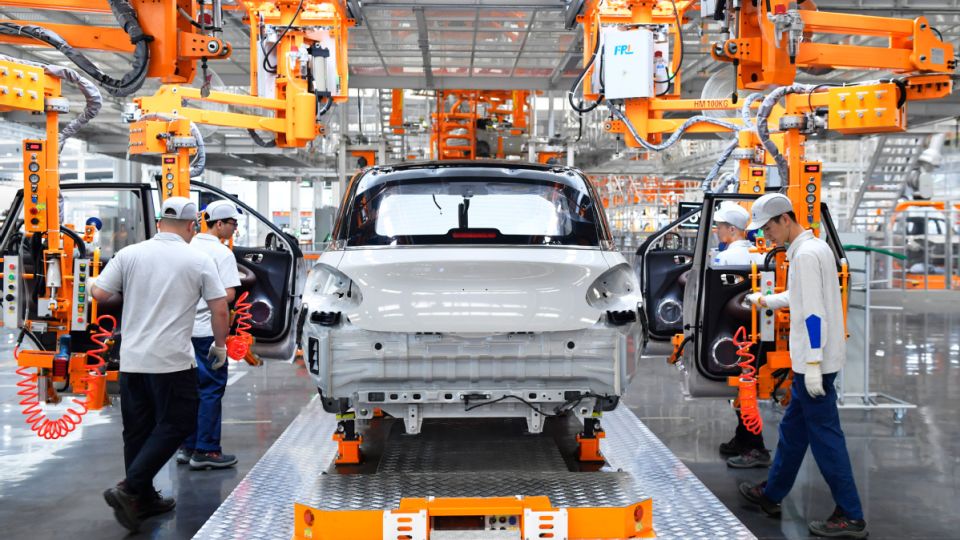BRUSSELS, BEIJING (ANN/CHINA DAILY) – The European Commission declared on Wednesday that, as a result of an anti-subsidy investigation initiated in October, punitive countervailing tariffs will soon be imposed on battery electric vehicles manufactured in China.
The Commission stated it “has provisionally concluded that the BEVs value chain in China benefits from unfair subsidisation, posing a threat of economic injury to EU BEV producers.”
The new countervailing duties will vary by brand, with 38.1 per cent tariffs on SAIC, 20 percent on Geely, and 17.4 per cent on BYD, in addition to the existing 10 per cent import tariffs.
China has expressed significant concern and dissatisfaction with the European Commission’s decision, according to the Ministry of Commerce on Wednesday.
The Ministry has urged the European Union to rectify its decision and engage in dialogue to address the trade dispute, as stated on the ministry’s website.
The Ministry emphasised that the decision disregards factual evidence and World Trade Organisation (WTO) rules, despite China’s repeated objections and warnings from several EU member states and industry sectors.
The ruling overlooks that China’s competitive edge in the electric car sector is due to fair competition, violating WTO rules and failing to recognise the cooperation of Chinese companies during the investigation, the spokesperson added.
Furthermore, the decision is seen as protectionism that will escalate trade tensions and undermine fair competition, potentially disrupting the global automotive supply chain and harming China’s electric car industry, the spokesperson noted.
The European Commission’s actions could negatively impact European consumers and hinder the EU’s goals of green transition and global climate change collaboration, the spokesperson warned.
China will monitor developments and is ready to take measures to protect the rights of the affected Chinese companies, the spokesperson added.
Additionally, the Foreign Ministry called on the EU to honour its commitment to free trade and reject protectionism. Ministry spokesman Lin Jian labelled the anti-subsidy investigation as protectionist, arguing that it violates market economy principles and international trade rules.
Lin also highlighted that the EU’s tariffs on Chinese EVs could harm China-EU economic and trade cooperation and the stability of global automotive supply chains, ultimately damaging Europe’s interests.

The spokesman added that political figures from several European countries and representatives from the European auto industry have recently expressed opposition to the anti-subsidy investigation, saying that they believe imposing additional tariffs on Chinese EVs to protect the EU industry is a misguided approach.
“Protectionism is not the way forward, while openness and cooperation are the right path,” Lin said.
He urged the EU to work together with China to uphold the overall situation of China-EU economic and trade cooperation. China will take all necessary measures to firmly defend its legitimate rights and interests, he added.
The European Commission said it has reached out to Chinese authorities to discuss the findings and explore possible ways to resolve the issues in a WTO-compatible manner.
“Should discussions with Chinese authorities not lead to an effective solution, these provisional countervailing duties would be introduced from July 4,” the commission said.
In a statement on Wednesday, the Chinese Chamber of Commerce to the EU expressed “its shock, grave disappointment and deep dissatisfaction with the protectionist trade measure” by the European Commission.
“The CCCEU believes these measures will seriously impair the legitimate rights and interests of BEV companies and exert negative impacts on China-EU trade and cooperation in the automotive sector,” it said.
According to a recent CCCEU survey within the Chinese BEV industry, imposition of a 10 percent additional levy would already carry significant implications for most Chinese car manufacturers, resulting in a substantial negative impact on their exports to Europe.
The rates ranging from 17.4 percent to 38.1 percent will pose a serious market barrier, the CCCEU said.
Despite China’s strength in the global BEV production and sales market, exports of BEVs to the EU accounted for only about 5 percent of China’s BEV production in 2023. The market share of China’s BEV brands in the European market has consistently remained lower than that of local European companies, according to the CCCEU.
The CCCEU also said that the EU’s investigation into China’s BEVs was politically motivated, driven by protectionism, and lacked substantive complaints from its own industry.
“In contrast, numerous European industry representatives have voiced concerns regarding the investigation, citing potential negative impacts on Chinese and European BEV supply chains, innovation and market cooperation,” the CCCEU said, adding that the chamber and the Chinese car industry also share these concerns.
Carl Bildt, co-chair of the European Council on Foreign Relations and a former Swedish prime minister, said on social media on Wednesday that he’s “not too worried by what is said to be Chinese EV subsidies — if they want to subsidise the EU green transition, which really needs to speed up, then it’s OK with me.”
David Henig, director of the United Kingdom Trade Policy Project at the Brussels-based European Centre for International Political Economy, wrote on social media: “In essence, the real purpose of EU tariffs is giving the domestic industry a few years to become closer to competitive as the Chinese industry or to receive investment from them. Yes there are subsidies, but so there are everywhere. China started on EV way earlier.”
Minister of Commerce Wang Wentao, on a recent trip to Europe, dismissed accusations of “unfair competition” made by the EU and the United States, calling them groundless. He said some countries are implementing high tariffs, discriminatory subsidies, investment restrictions and unilateral sanctions that contravene WTO rules, with the aim of excluding Chinese companies from their markets.
“This is not fair competition at all,” Wang said.


